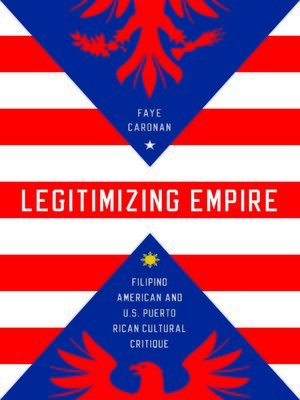Legitimizing Empire
ebook ∣ Filipino American and U.S. Puerto Rican Cultural Critique · Asian American Experience
By Faye Caronan

Sign up to save your library
With an OverDrive account, you can save your favorite libraries for at-a-glance information about availability. Find out more about OverDrive accounts.
Find this title in Libby, the library reading app by OverDrive.



Search for a digital library with this title
Title found at these libraries:
| Library Name | Distance |
|---|---|
| Loading... |
When the United States acquired the Philippines and Puerto Rico, it reconciled its status as an empire with its anticolonial roots by claiming that it would altruistically establish democratic institutions in its new colonies. Ever since, Filipino and Puerto Rican artists have challenged promises of benevolent assimilation and portray U.S. imperialism as both self-interested and unexceptional among empires.
Faye Caronan's examination interprets the pivotal engagement of novels, films, performance poetry, and other cultural productions as both symptoms of and resistance against American military, social, economic, and political incursions. Though the Philippines became an independent nation and Puerto Rico a U.S. commonwealth, both remain subordinate to the United States. Caronan's juxtaposition reveals two different yet simultaneous models of U.S. neocolonial power and contradicts American exceptionalism as a reluctant empire that only accepts colonies for the benefit of the colonized and global welfare. Her analysis, meanwhile, demonstrates how popular culture allows for alternative narratives of U.S. imperialism, but also functions to contain those alternatives.
| Cover Title Copyright Contents Acknowledgments Introduction 1. Consuming (Post)Colonial Culture: Multicultural Experiences in Travelogues and Ethnic Novels 2. Revising the Colonialism-as-Romance Metaphor: From Conquest to Neocolonialis 3. Bastards of U.S. Imperialism: Demanding Recognition in the American Family 4. Performing Genealogies: Poetic Pedagogies of Disidentification Conclusion: Imagining the End of Empire Notes Bibliography Index | "A great companion to the best books on imperialism and its multiple genres as well as a smart and useful guide to reading contemporary cultural texts that subversively persist in enabling alternative renditions of U.S. multiculturalism."
—Rick Bonus, author of Locating Filipino Americans: Ethnicity and the Cultural Politics of Space
"[Legitimizing Empire's] successful location of both mainstream American culture and the subcultures examined in the context of historic American imperialism (and ongoing neo-imperialism) is impressive and thought provoking. It very effectively challenges enduring narratives of "benevolent assimilation" in the history of American imperialism, and of multiculturalism as retrospectively justifying such US exceptionalism."—H-Empire
"Legitimizing Empire offers fresh insights into the continuities and divergences of Philippine and Puerto Rican histories in ways that reveal the seemingly monolithic but uneven deployment of U.S. empire. This work is profoundly instructive both in terms of its illuminating comparative framework which, in itself, approximates so well a non-exceptionalist rendition of U.S. imperial history, but also in its calculated engagement with cultural production as a critique of empire emanating from multiple locations—from the nations/territories themselves and in places where diasporic populations are situated. A great companion to the best books on imperialism and its multiple genres as well as a smart and useful guide to reading contemporary cultural texts that subversively persist in enabling alternative renditions of U.S. multiculturalism."—Rick Bonus, author of Locating Filipino Americans: Ethnicity and the Cultural Politics of Space
|Faye Caronan is an assistant professor of ethnic studies at the University of Colorado Denver.
Faye Caronan's examination interprets the pivotal engagement of novels, films, performance poetry, and other cultural productions as both symptoms of and resistance against American military, social, economic, and political incursions. Though the Philippines became an independent nation and Puerto Rico a U.S. commonwealth, both remain subordinate to the United States. Caronan's juxtaposition reveals two different yet simultaneous models of U.S. neocolonial power and contradicts American exceptionalism as a reluctant empire that only accepts colonies for the benefit of the colonized and global welfare. Her analysis, meanwhile, demonstrates how popular culture allows for alternative narratives of U.S. imperialism, but also functions to contain those alternatives.
| Cover Title Copyright Contents Acknowledgments Introduction 1. Consuming (Post)Colonial Culture: Multicultural Experiences in Travelogues and Ethnic Novels 2. Revising the Colonialism-as-Romance Metaphor: From Conquest to Neocolonialis 3. Bastards of U.S. Imperialism: Demanding Recognition in the American Family 4. Performing Genealogies: Poetic Pedagogies of Disidentification Conclusion: Imagining the End of Empire Notes Bibliography Index | "A great companion to the best books on imperialism and its multiple genres as well as a smart and useful guide to reading contemporary cultural texts that subversively persist in enabling alternative renditions of U.S. multiculturalism."
—Rick Bonus, author of Locating Filipino Americans: Ethnicity and the Cultural Politics of Space
"[Legitimizing Empire's] successful location of both mainstream American culture and the subcultures examined in the context of historic American imperialism (and ongoing neo-imperialism) is impressive and thought provoking. It very effectively challenges enduring narratives of "benevolent assimilation" in the history of American imperialism, and of multiculturalism as retrospectively justifying such US exceptionalism."—H-Empire
"Legitimizing Empire offers fresh insights into the continuities and divergences of Philippine and Puerto Rican histories in ways that reveal the seemingly monolithic but uneven deployment of U.S. empire. This work is profoundly instructive both in terms of its illuminating comparative framework which, in itself, approximates so well a non-exceptionalist rendition of U.S. imperial history, but also in its calculated engagement with cultural production as a critique of empire emanating from multiple locations—from the nations/territories themselves and in places where diasporic populations are situated. A great companion to the best books on imperialism and its multiple genres as well as a smart and useful guide to reading contemporary cultural texts that subversively persist in enabling alternative renditions of U.S. multiculturalism."—Rick Bonus, author of Locating Filipino Americans: Ethnicity and the Cultural Politics of Space
|Faye Caronan is an assistant professor of ethnic studies at the University of Colorado Denver.







